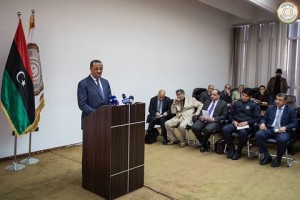By Libya Herald reporter.

Tunis, 6 April 2015:
The Prime Minister reiterated his support for the rebuilding of state security institutions and his . . .[restrict]full support for the UN-led political dialogue in Morocco.
Speaking at an expanded government press conference in Beida on Saturday, Abdullah Thinni quashed suggestions that there were tensions between his government and the Libyan National Army.
”There are those that maintain that the relationship between the military institutions and the government are not good, which is shameful to say as the military institution is the institution that we strongly seek to build – be it in the form of the army or the police ‘’, he said emphatically.
”We know that these two institutions were marginalized after 17th February revolution, especially by the Islamist political wing that wanted to marginalize the building of the army and police’’, he explained.
‘‘They created opposing or parallel bodies (armies) such as the Shields which they paid attention to and spent huge amounts on. But these opposing armies did not fulfil the desired aim (of imposing security)’’.
”Also the parallel bodies that were created in the security apparatus weakened the building of police cadres’’, he added explaining the negative effect of the strengthening of the Shield militias at the expense of the regular army and police.
”We are working with all the correct coordination (with the security institutions). It is correct that the capabilities are limited, but the relationship between the military institution and the political leadership is at its highest standing’’.
”It is possible that the (financial) support is limited for the military institution could need billions because it was totally destroyed during the 17 Feb revolution, and what was not destroyed was stolen by militias and has become outside the control of the state’’.
”Therefore the army is in need of rearming from A to Z’’, the Prime Minister stated.
Thinni also moved to quash rumours of internal divisions between the government and the HoR regarding the UN-led political dialogue taking place in Morocco.
There are suggestions that the government may not accept any agreement reached with the opposing GNC-Libya Dawn coalition, and therefore may refuse to implement it.
‘‘It is the parliament (House of Representatives – HoR) that is engaging in dialogue with the other party and as long as the body that we (the government) are born from (the HoR) continues to engage in dialogue, we therefore recognize the dialogue’’.
‘‘That is natural and anything that results out of the dialogue – the government is obliged to implement’’, concluded the Prime Minister. [/restrict]






